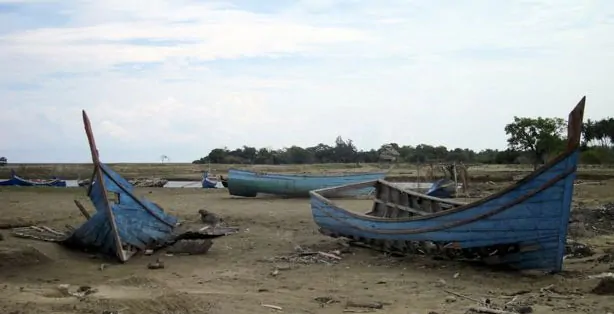
The recent earthquake in New Zealand, and last year’s earthquake in Haiti, seems to have raised awareness that we live in an unstable world with no guarantees. Lately, I’ve heard many conversations about natural disasters. But our response should be more than just talk. As Christians, we’re called to react to these disasters as Christ would, not forgetting about them quickly, but remembering that the people affected have a special place in God’s heart.
Today, I offer just three stories—out of hundreds of thousands—of three individuals whose lives have been irrevocably changed by three different disasters.
Nana lived in a fishing community with her husband and two children. The 2004 tsunami struck on a day when her husband had gone to the city market. She was at home, eight months pregnant with their third child. When she heard the wave coming (locals say it sounded like a powerful helicopter), Nana gathered her children and started running for the hills behind their home. Because Nana was slowed by her children and pregnancy, her neighbors left her behind, but she and her children still made it up the mountain before the wave struck. Her husband was never found. Nana’s home was completely destroyed, so she lived with other family members for months after the tsunami. Eventually, she remarried, mostly so that her children would have some financial security. World Relief was able to help her rebuild her home, as well as start a business. “I’ve felt sad since the tsunami,” Nana said. “Even with a new husband, it’s not the same. I smile and laugh to try to cover up how I feel, but it’s not the same.”
Many people are still dealing with post-traumatic stress years after the tsunami.
On Sept. 30, 2009, a massive earthquake occurred in West Sumatra, Indonesia. Samsul was sleeping in his bedroom when it struck.
“The house collapsed around me, and I was trapped. I was very frightened. But after it was over and the dust started to settle, my family outside started calling for me, and helped me find a hole to crawl out. … I still have no idea how long it will take for us to rebuild our home—it depends on money. Even cleaning up the debris from my old home takes money, and I still have to work for food. I don’t have any extra money for these unexpected expenses.”
Samsul’s wife and some of their children sleep under tables at a small restaurant next door to the rubble that used to be their home. Samsul and the rest of the children sleep on the fallen walls of their old home.
Homelessness is still an issue in West Sumatra, even though the earthquake happened more than six months ago. Some families, like Samsul’s, camp around their old homes. Others have moved in with family members or neighbors, placing increased financial burdens on those compassionate households. Many depend on subsistence living, leaving them unprepared for rebuilding after disasters strike.
My friend Joanna relates a story from the aftermath of the Haiti earthquake.
I spoke with Belizaire, a World Relief driver. He told me how grateful he is that his four children and his siblings survived the earthquake. His house, though, is uninhabitable, and they too are sleeping outside—underneath only a barely there tarp. His kids—8, 13, 16 and 19—are having trouble sleeping. Each time a helicopter passes or a car rumbles by, they fear it could be another quake. He tries to tell them to “soit tranquille” and to assure them they are safe. Despite losing everything, he said he knows God is in control of the situation. His children ask him what their future will be like, and if they will ever have money for a new house. Belizaire is facing these big questions alone. He lost his wife a few years ago.
“‘Don’t worry, don’t worry,’ I tell them. ‘If God wants to, He will provide to rebuild.’ They ask me, ‘But how?’ I say, ‘He can.’”
Belizaire referenced the Israelites in the desert, and how God provided food and water for them—necessities that are in scarce supply in Port-au-Prince. He said if his faith is as small as a mustard seed, God will move the mountains in his life. And he said it with conviction. He believes it for himself—but most of all he believes it for his children.
A few nights ago as they tried to fall asleep, Belizaire’s youngest daughter, Jennifer, asked him, “Are we going to spend all of our nights out here?” “No, no, not at all,” he responded. “Will God help us?” she asked timidly. “Oui, oui, oui.” Jennifer paused thoughtfully, “Well we should pray now that God changes the situation.” Belizaire said he was so touched that he wept.
In the midst of a shattered life, Belizaire continues to work because he has no other choice. The grief and fear that have compounded and rippled across this city and nation in the last few months is too much to comprehend.
Before Belizaire departed to trek back to his ruined house and sheet under the stars, he turned to me with a smile. “I believe that God can change the bad situation to good.”
I have a lot I need to do today—errands to run, phone calls to make, bills to pay, chores to finish. But in the busyness of just plain old living, I need to remember who God is—friend to the forgotten, who notices when sparrows struggle. How much more so does He notice the plight of each of His image-bearers? Although we Christians are called to be imitators of God, it can be difficult to remember people around the world whose lives have been affected by struggles outside of their control. It’s difficult to remember, to work to understand contexts that are so foreign to our own. But we are called to love as God loves. He dwells among the broken in the midst of disaster. He has plans for restoring the lives of Belizaire, Samsul and Nana, and somehow we Christians have the privilege of being part of that plan. As impossible as it seems, He will enable us to do it.
Here are some ideas:
- Get informed! Learn more about the world we live in, and the disasters that continue to affect lives around the world. Follow new disasters from the beginning until complete restoration, even though this will likely take many years. Months or years after the media has left, lives remain broken—and individuals continue to struggle just to survive. Newspapers, blogs by people on the ground and relief agency websites are all good places to start getting informed.
- Be particular in your prayer. The Bible portrays God as one who knows each of us by name, who cares about each of us individually. The more specifically you can pray, the better you imitate God and the more likely you will be able to be aware of the results of your prayer.
- As you learn more about disasters in our world, you’ll probably want a more active role in the stories you see unfolding. Keep in mind that going or sending supplies may not be the most effective response. Many people wanted to go to Haiti immediately after the earthquake, not realizing there was not enough clean water or food for the people who lived there, let alone visitors. Disaster response experts are the best people to respond immediately, but let that be incentive to get creative in responding in other ways! Relief agencies will be glad to help you brainstorm ideas.
- Disaster relief is a marathon, not a sprint. Likewise, the life of a Christian is also marathon, as we’re called to be counter-culturally faithful over the long haul. “Run in a way to receive the prize” (1 Corinthians 9:24). As Christians, our work does not stop when people have food, water or even shelter. We should pursue holistic restoration—emotionally, spiritually, physically—to see people not just surviving, but living life to the fullest.
- God is already present in disaster situations around the world. We have the opportunity to join with what He is already doing. In reflecting on her time in Haiti, Joanna told me that: “The most impossible yet reassuring thing to learn was that God was present in Haiti. At one point while feeling helpless in the face of such great tragedy, I told God I could not carry it all. Immediately, I felt Him gently but firmly replying that I was not required to bear this load, but simply to be there with Him … because He was there, right in the middle of the whole big mess, mourning with and comforting those affected.”
Kerstin Pless works for World Relief, storytelling for World Relief’s Asia offices. Joanna Mayhew works for World Relief as an HIV/AIDS programs advisor. To read more of Joanna’s reflections about the earthquake in Haiti, check out http://scatteredink.wordpress.com/. To learn more about World Relief’s work, please visit WorldRelief.org.






















